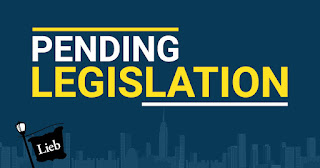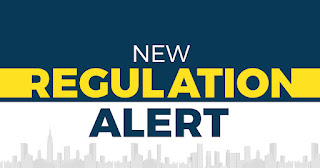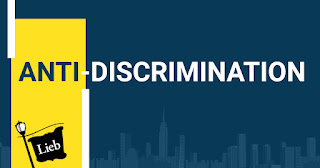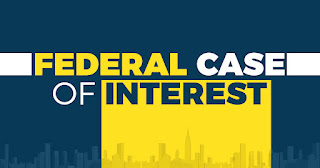New York tenants will be receiving new notices about their rights to reasonable modifications and accommodations for persons with disabilities as of today.
The Division of Human Rights has officially adopted 9 NYCRR 466.15 - see our prior blog on the topic here.
The new law places a tremendous onus, with awesome exposure, on the following people: "the owner, lessee, sub-lessee, assignee, or managing agent of, or other person having the right to sell, rent or lease a housing accommodation, constructed or to be constructed, or any agent or employee thereof." The law applies to both private property and publicly-assisted housing.
There is a special section in the law just for real estate brokers, who are now obligated to provide the notice at the first point of substantive contact.
Plus, every obligee must also prominently and conspicuously display a link to the notice "on the homepage of such website." Unfortunately, the link, which is supposed to "be made available by the Division," is not so available.
Nonetheless, here is the official notice and it's language (if you haven't realized it yet, housing providers and their real estate brokers better get up to speed on providing reasonable accommodations and modifications today. Failure-to-accommodate lawsuits are about to be filed with record speed / frequency):
NOTICE DISCLOSING TENANTS’ RIGHTS TO REASONABLE ACCOMMODATIONS FOR PERSONS WITH DISABILITIES
Reasonable Accommodations
The New York State Human Rights Law requires housing providers to
make reasonable accommodations or modifications to a building or living
space to meet the needs of people with disabilities. For example, if you have a physical, mental, or medical impairment, you can ask your housing provider to make the common areas of your building accessible, or to change certain policies to meet your needs.
To request a reasonable accommodation, you should contact your property manager by calling ______________ or ______________, or by e-mailing ______________. (note: brokers may delete "by calling ______________ or ______________, or by e-mailing ______________.)
You will need to inform your housing provider that you have a disability or health problem that interferes with your use of housing, and that your request for accommodation may be necessary to provide you equal access and opportunity to use and enjoy your housing or the amenities and services normally offered by your housing provider. A housing provider may request medical information, when necessary to support that there is a covered disability and that the need for the accommodation is disability related.
If you believe that you have been denied a reasonable accommodation for your disability, or that you were denied housing or retaliated against because you requested a reasonable accommodation, you can file a complaint with the New York State Division of Human Rights as described at the end of this notice.
Specifically, if you have a physical, mental, or medical impairment, you can request:
- Permission to change the interior of your housing unit to make it accessible (however, you are required to pay for these modifications, and in the case of a rental your housing provider may require that you restore the unit to its original condition when you move out);
- Changes to your housing provider’s rules, policies, practices, or services;
- Changes to common areas of the building so you have an equal opportunity to use the building. The New York State Human Rights Law requires housing providers to pay for reasonable modifications to common use areas.
Examples of reasonable modifications and accommodations that may be requested under the New York State Human Rights Law include:
- If you have a mobility impairment, your housing provider may be required to provide you with a ramp or other reasonable means to permit you to enter and exit the building.
- If your healthcare provider provides documentation that having an animal will assist with your disability, you should be permitted to have the animal in your home despite a “no pet” rule.
- If you need grab bars in your bathroom, you can request permission to install them at your own expense. If your housing was built for first occupancy after March 13, 1991 and the walls need to be reinforced for grab bars, your housing provider must pay for that to be done.
- If you have an impairment that requires a parking space close to your unit, you can request your housing provider to provide you with that parking space, or place you at the top of a waiting list if no adjacent spot is available.
- If you have a visual impairment and require printed notices in an alternative format such as large print font, or need notices to be made available to you electronically, you can request that accommodation from your landlord.
Required Accessibility Standards
All buildings constructed for use after March 13, 1991, are required to meet the following standards:
- Public and common areas must be readily accessible to and usable by persons with disabilities;
- All doors must be sufficiently wide to allow passage by persons in wheelchairs; and
- All multi-family buildings must contain accessible passageways, fixtures, outlets, thermostats, bathrooms, and kitchens.
If you believe that your building does not meet the required accessibility standards, you can file a complaint with the New York State Division of Human Rights.
How to File a Complaint
A complaint must be filed with the Division within one year of the alleged discriminatory act or in court within three years of the alleged discriminatory act. You can find more information on your rights, and on the procedures for filing a complaint, by going to www.dhr.ny.gov, or by calling 1-888-392-3644. You can obtain a complaint form on the website, or one can be e-mailed or mailed to you. You can also call or e-mail a Division regional office. The regional offices are listed on the website.



















